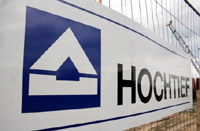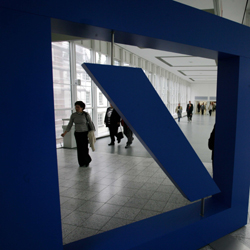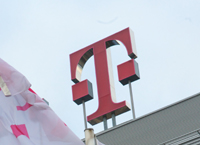ACTIONS CORNER
 Shareholders are preparing a class-action lawsuit in the amount of 400 million Australian dollars against HOCHTIEF subsidiary Leighton Holdings, for a profit warning in April. Maurice Blackburn announced the action on 1 September, and accused the Australian company of having violated its ongoing disclosure obligations. The shareholders are demanding compensation because Leighton had on their assessment not informed them in time of cost increases, delays in two major projects and the need for further depreciation in a joint venture. Leighton has as yet been served no action.
Shareholders are preparing a class-action lawsuit in the amount of 400 million Australian dollars against HOCHTIEF subsidiary Leighton Holdings, for a profit warning in April. Maurice Blackburn announced the action on 1 September, and accused the Australian company of having violated its ongoing disclosure obligations. The shareholders are demanding compensation because Leighton had on their assessment not informed them in time of cost increases, delays in two major projects and the need for further depreciation in a joint venture. Leighton has as yet been served no action.
The Deutsche Bank did not discriminate against Effecten-Spiegel in the acquisition of Postbank, and need not pay former Postbank shareholders anything more. On 29 July Cologne Regional Court dismissed as unfounded a complaint from the investment company, which had sued for a higher settlement offer. In 2009 Deutsche Bank acquired over 25 percent of the shares, 22.9 percent from Deutsche Post, the rest from private investors. A mutual agreement on options for an additional 12.1 percent concluded between the old and new owners before the bankruptcy of Lehman Brothers in September 2008 was based on prices for Postbank shares of €45-49. The Düsseldorf company, which got only 25 euros per share, felt disadvantaged by this arrangement.
 The criminal proceedings against Rolf Breuer before Munich Regional Court I were stayed on 18 August before the indictment was read. The defence had asked for a suspension because it had not been informed in time about the composition of the court, said Judge Anton Winkler. Due to scheduling conflicts, the court had commissioned an alternate lay judge, but the replacement also had to cancel his participation. The Code of Procedure provides, however, that a trial can only be interrupted for three weeks. Judge Winkler thereupon stayed the proceedings, as the period of one week envisaged for the interruption threatened the judges' vacation plans. The former Deutsche Bank chief had publicly questioned Leo Kirch's creditworthiness nine years ago.
The criminal proceedings against Rolf Breuer before Munich Regional Court I were stayed on 18 August before the indictment was read. The defence had asked for a suspension because it had not been informed in time about the composition of the court, said Judge Anton Winkler. Due to scheduling conflicts, the court had commissioned an alternate lay judge, but the replacement also had to cancel his participation. The Code of Procedure provides, however, that a trial can only be interrupted for three weeks. Judge Winkler thereupon stayed the proceedings, as the period of one week envisaged for the interruption threatened the judges' vacation plans. The former Deutsche Bank chief had publicly questioned Leo Kirch's creditworthiness nine years ago.
Four employees of Deutsche Bank and Deutsche Securities Korea are threatened with proceedings for improper trading activities. Because of the placement of large sell orders shortly before the close of trading, the South Korean stock market experienced an unusually sharp fall in ten minutes’ trading in November 2010, with market capital worth $27 billion destroyed. On 19 August prosecutors lodged an indictment in this context in Seoul. They accuse the four bankers of having made 44.8 million won (28.5 million euros) thereby.
In the trial about sales-tax fraud in CO2 certificates, the role of the Deutsche Bank has moved to the centre. Another defendant has confessed before the Frankfurt District Court to executing transactions relevant to the evasion of 36 million euros turnover tax in emissions trading. He says he was hired by two securities dealers from the UK to run the million-euro purchase and sale of carbon-emissions-trading certificates. Only the Deutsche Bank had made the trade possible, by providing the necessary funding. Immediately, numerous customers presented themselves. The Bank believes that it neither caused nor is responsible for a tax loss.
The U.S. has renewed and expanded its accusations against the Deutsche Bank in litigation because of the activities of MortgageIT, as an application filed on 22 August in a U.S. court in Manhattan shows. The authorities so far accused the bank that its U.S. real-estate subsidiary bought in 2007 had made false statements in order to gain free access to a government programme that underwrote mortgages. The bank had already known prior to the acquisition of the real-estate subsidiary that it had made false statements. Thus, Germany's largest bank had to be financially liable.
The FDIC has to face a ten billion dollar action brought by Deutsche Bank, after a federal judge dismissed the complaint against the lawsuit by the U.S. deposit insurance agency. It is about Washington Mutual (WaMu), which had collapsed under the weight of rotten mortgage loans in 2008 and had to be rescued by the FDIC. The Deutsche Bank National Trust as trustee of mortgage securities had filed the action against WaMu in 2009 on the grounds that it had securitized loans which did not have the promised quality. The institution had thus lost investors billions of dollars.
 The U.S. Department of Justice surprisingly announced on 31 August that it would act against the acquisition of T-Mobile USA by AT&T. The agency fears the transaction would further set back competition in the mobile market. In its complaint, the entire case is in federal court in Washington. Deutsche Telekom must now work out alternatives to a sale to its U.S. competitor; but the company had "several scenarios" for strategies, said Niek van Damme. The original transaction has still not finally failed, though; AT&T is known in America for its aggressive lobbying.
The U.S. Department of Justice surprisingly announced on 31 August that it would act against the acquisition of T-Mobile USA by AT&T. The agency fears the transaction would further set back competition in the mobile market. In its complaint, the entire case is in federal court in Washington. Deutsche Telekom must now work out alternatives to a sale to its U.S. competitor; but the company had "several scenarios" for strategies, said Niek van Damme. The original transaction has still not finally failed, though; AT&T is known in America for its aggressive lobbying.















